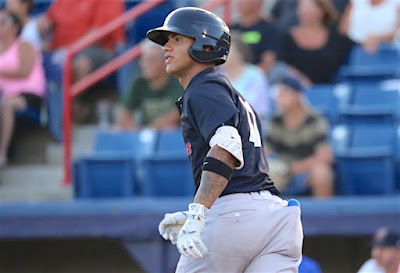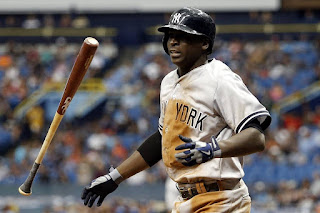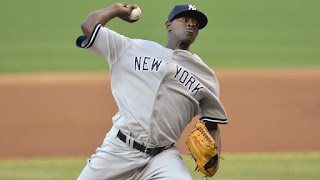Ceilings and floors for top prospects
For
the first time in a very long time the Yankees are considered to have one of,
if not the, top farm systems in all of baseball. In 2015 we saw a new strategy
from the Yankees, who hit the reset button and traded a handful of big name
vets for blue-chip prospects. This was a long time coming for the Yankees. It
was only a matter of time before their aging core of homegrown talent retired
and their hefty free agent signings of the mid-to-late 2000’s went downhill.
But rebuilding a Major league farm system is not an easy task. MLB is not
equivalent to the NFL, NBA, or even the NHL.
Photo Credit: Tim Holle/Brevard County Manatees
Bryce Harper was the first
prospect I ever remember being labeled a “sure thing.” Lebron James type,
straight from high school to the big league players don’t exist. On top of
that, it can take years to know if your picks are a bust or on a path to the
big leagues. Unlike the NFL, where you can screw up a pick today and come back
strong the next year, your pay off in the Major Leagues takes time. All these
factors contribute to the difficulty of cultivating a rich farm system and
developing young stars that can contribute at the Major leave level.
Getting
younger isn’t a choice; it’s a necessity if you want to build a long-term
winner. Without homegrown talent your payroll will be astronomical, because the
only way to obtain top tier talent is to shell out huge contracts. As the Yanks
seem to be sticking to their plan of being more frugal, this is no longer an
option. Also, we see what happens in the backend of those mega contracts. You will eventually have to pay the prospects,
but at least you’ll be getting a guy going into his prime who is used to his
environment and team culture.
With
this all being said, let’s be realistic about each one of the top prospects. It’s
important not to overvalue a prospect and their abilities. With every Derek
Jeter there are 10 Eric Duncans. So when we hear trade rumors for a legitimate,
proven MLB star requiring top prospects, we must be careful to not quickly
dismiss it. I wanted to map out the scouts grades and ceiling/floor player
comparisons of the Yankees top prospects. Putting this into perspective will
help us visualize the risk & reward of holding onto these guys or dealing
them for other talent.
Note: The official 2017 prospect rankings
aren’t out, so these are based on my knowledge, Baseball America, MLB’s 2016
rankings, and Baseball Prospectus. Also, I’m trying to be realistic with their
major league comparisons, but for the record I hope each prospect is 10x better
than their ceiling comparison. Lastly, the comps relate to their future major
league production. I’m not so much comparing swings, mechanics, etc.
GRADING KEY
A
level – Elite blue chip prospects. Greatest opportunity to not only make the
major leagues, but be successful at a higher than above average level.
B
level – Highly skilled prospect, but not quite elite. Great opportunity to
enjoy successful major league careers as average or at least rotational players.
C
level – Possess high level or even blue chip skills, but also have multiple
question marks or developmental road blocks.
1)
Gleyber Torres –Shortstop – GRADE A
Ceiling:
Jimmy Rollins
Floor:
Alex Gonzalez
By
all accounts Torres will be a successful major leaguer barring injury. It’s
pretty solid when your floor comp is a former outfielder. The question is, just
how good could he be. Gleyber’s most
impressive trait is his mature plate discipline. His ability to work counts and
get on base is extremely rare for a player his age. He is above average in
contact, power, speed, and defense. Interestingly enough, some prospects think
he may struggle to develop as a defender, but others think he can be a gold
glove shortstop. His defensive technique mixed with his athletic ability lead
me to be it’ll trend more toward the latter. He has above average speed but his
base stealing technique needs work, which is certainly not a red flag. Again,
his difficulty will be to put it all together. Can he successfully hit for
power, while being a plus defender and semi- speedster? The tools and maturity are certainly all there.
2)
Clint Frazier – Outfield – GRADE A-
Ceiling:
Bobby Abreu
Floor:
Eric Byrnes
Tons
of people have likened Frazier to Josh Donaldson or even Mike Trout. I’m not
currently buying those comparisons. Frazier is a physical beast; just take a look at
his social media this off-season, and he also has elite bat speed that cannot
be taught. But he has a bit of a hitch in his swing, which needs to be worked
out if he wants to cut down on his strikeouts and hit breaking pitches at the
Major League level. This hitch may deprive him of the monster power that his
physical appearance suggests he’s capable of. But, like Abreu he has impressive
bat control that allows him to hit to all fields and put the head of the bat
seemingly wherever he wants it.
Defensively, his arm is above average but his route to balls must
improve. There is no reason he can’t settle into a corner outfield spot and be
a solid defender. His speed is good, not great and it wont get any better as he
gets bigger and stronger. His best asset on the bath paths is his first to
third speed. He certainly is a gamer who is confident in himself and his
abilities. It will be interesting to see how he handles adversity as he
approaches the move to the Majors.
3)
Blake Rutherford – Outfield – GRADE
A-/B+
Ceiling:
J.D. Drew
Floor:
Mark Kotsay
Many
projected Rutherford as the best bat in the 2016 draft, but signability issues
scared many teams away allowing the Yanks to steal him with the 18th pick.
Scouts see him as a 5-tool prospect, with only his arm a bit in question.
Rutherford has impressed thus far pulling in an overall .351 in a season or so
in the minors. His average arm strength will probably push him out of
Centerfield into a corner outfield spot. He hasn’t flashed the power many think
he is capable of, but his contact rate is tremendous and he has shown a great
ability to get on base. He is extremely athletic and his body has room to get
stronger and faster. His maturity is high and he is known to be a student of
the game. If he properly develops he has the chance to be a .300/20+ HR guy.
4)
Jorge Mateo – Shortstop – GRADE B+
Ceiling:
Edgar Renteria
Floor:
Pokey Reese
Jose
Reyes is thrown around a lot as a comparable ceiling for Mateo. If you break
down his swing, that doesn’t make too much sense, because at this stage of the
game it’s a bit long which doesn’t translate to a high OBP guy like Reyes. This
will also make it difficult for him to be a leadoff hitter. His speed is deadly
but based on his current approach I’d project him best case in a two-hole spot
or at the bottom of the lineup to turn it over. Of all the prospects, Mateo may
be the hardest to project because of how raw he is. He is the definition of
boom or bust depending on how he develops. Defensively his speed allows him to
get to balls others couldn’t even dream of. But like everything else, his
technique is lacking. At the plate he has great power for his size, but again
he has a bit of a long swing and overly aggressive approach. If he can bring
his contact rate up he could be a huge success because of his game changing
speed. He has already proven he can hit to all fields, now like most prospects,
he needs to cut down the strikeouts and work on his walk rate.
5)
Justus Sheffield – LHP – GRADE B+
Ceiling:
Mike Hampton
Floor:
Oliver Perez
Listed
at a generous 5’10, Sheffield is undersized, but his motion is fluent and
effortless. His fastball regularly sits in the mid-nineties through out his
starts. He has excellent movement on his
fastball and normally can locate extremely well. A slider and a changeup make
up his 3-pitch repertoire. His slider is a plus pitch that he keeps low in the
zone. The development of his change-up is what has the Yankees most excited and
moved Sheffield away from a relief projection, to a possible front-end
starter. Fine tuning his mechanics,
staying healthy, and working on his change-up command will be Sheffield’s keys
to success.
Part 2 coming next week…



Comments
Post a Comment